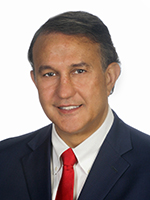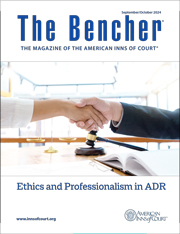The Bencher | September/October 2024
ABA Issues Formal Ethics Opinion on Witness Preparation
By Francis G.X. Pileggi, Esquire

 The American Bar Association’s (ABA) Formal Opinion 508 (August 5, 2023), titled The Ethics of Witness Preparation, discusses the boundaries for preparation of a witness in advance of a deposition or an adjudicative proceeding—beyond which preparation becomes unethical coaching or manipulation of witness testimony. The word “coaching” in this context is referred to in the Formal Opinion in a negative sense that is sometimes replaced with the synonyms “horseshedding” or “woodshedding” a witness.
The American Bar Association’s (ABA) Formal Opinion 508 (August 5, 2023), titled The Ethics of Witness Preparation, discusses the boundaries for preparation of a witness in advance of a deposition or an adjudicative proceeding—beyond which preparation becomes unethical coaching or manipulation of witness testimony. The word “coaching” in this context is referred to in the Formal Opinion in a negative sense that is sometimes replaced with the synonyms “horseshedding” or “woodshedding” a witness.
Model Rule of Professional Conduct 1.1 requiring competence and Rule 1.3 requiring diligence make it necessary for lawyers to prepare witnesses for testimony, for example, by showing them documents that they need to be familiar with or providing them with sample cross-examination questions they will likely need to answer.
Formal Opinion 508 discusses the distinction between preparing a client to give testimony and improperly seeking to influence that testimony. The Formal Opinion also discusses the increased opportunities for mischief with remote proceedings.
Unethical Pre-Testimony Coaching
The ABA Formal Opinion provides examples of conduct that is unquestionably over the line, such as counseling a witness to give false testimony, assisting a witness in offering false testimony, advising a client or witness to disobey a court order regulating discovery, offering an unlawful inducement to a witness, or procuring a witness’ absence from a proceeding. See Formal Opinion 508 at 4.
Model Rule 3.4(b) prohibits a lawyer from advising or assisting a witness—whether a client or not—to give false testimony. These bright lines are easy enough to understand, but more subtle and nuanced violations require vigilance. The heavily footnoted opinion also explains that it is unethical to compensate a lay witness for the substance of their testimony, even if the payment is for truthful testimony. See footnotes 21 and 23. See generally Francis G.X. Pileggi, “Chancery Addresses Legal Ethics of Paying Fact Witness”, Delaware Corporate & Commercial Litigation Blog (Aug. 12, 2011).
Unethical Conduct During Witness Testimony
In addition to limitations on preparing a witness, the ABA opinion provides examples of improper attempts to manipulate testimony while it is in progress. For example, winking at a witness during testimony or whispering to a witness in the middle of testimony are classic efforts to improperly influence testimony. Other more subtle types of signaling also implicate ethical obligations such as “speaking objections” or “suggestive objections.” These types of more subtle but still improper interference with testimony is prohibited in Delaware and other jurisdictions but is often observed in the breach. Other examples of improper interference with testimony in progress include instructing a witness not to answer a question without a proper basis to do so and discussing the substance of the deposition during a break in the deposition (both of which are prohibited expressly in Delaware.) Francis G.X. Pileggi, “Delaware Court of Chancery Enforces Deposition Practice Standards,” The Bencher (March/April 2015); Francis G.X. Pileggi, “No Such Thing as ‘Local Counsel’ in Delaware,” Delaware Corporate & Commercial Litigation Blog (May 13, 2021).
Misconduct in Remote Settings
I have previously written about remote deposition and remote hearing protocols. See Francis G.X. Pileggi, “Protocols & Professionalism for Remote Proceedings”, Delaware Corporate & Commercial Litigation Blog (Feb. 23, 2021). The ABA Formal Opinion suggests proactive precautions to minimize the risk of improper conduct during remote depositions, such as agreeing to protocols in advance for specific procedures to be followed for remote depositions or other remote hearings, as well as considering motions before or during a deposition to seek relief for abuses.
Formal Opinion 508 provides helpful guideposts for an important aspect of litigation. The extensive authorities provided in the footnotes also provide additional materials for further study. Good lawyers have always prepared witnesses in an appropriate manner, and these ABA guidelines for “not coloring outside the lines” are practical tips worthy of careful review.
Francis G.X. Pileggi, Esquire, is the managing partner of the Delaware office of Lewis Brisbois Bisgaard & Smith, LLP. He comments on key corporate and commercial decisions and on legal ethics topics on his Delaware Corporate & Commercial Litigation Blog, www.DelawareLitigation.com. He is the author of American Legal Ethics: A Retrospective from 1997 to 2018 and has written this ethics column for more than 25 years.